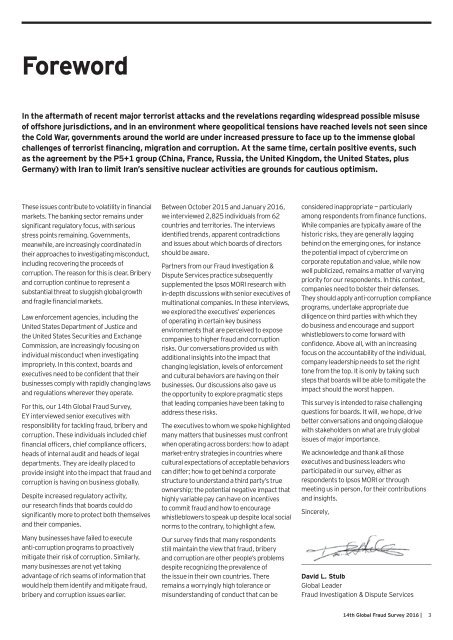Corporate misconduct — individual consequences
1VGrXvQ
1VGrXvQ
You also want an ePaper? Increase the reach of your titles
YUMPU automatically turns print PDFs into web optimized ePapers that Google loves.
Foreword<br />
In the aftermath of recent major terrorist attacks and the revelations regarding widespread possible misuse<br />
of offshore jurisdictions, and in an environment where geopolitical tensions have reached levels not seen since<br />
the Cold War, governments around the world are under increased pressure to face up to the immense global<br />
challenges of terrorist financing, migration and corruption. At the same time, certain positive events, such<br />
as the agreement by the P5+1 group (China, France, Russia, the United Kingdom, the United States, plus<br />
Germany) with Iran to limit Iran’s sensitive nuclear activities are grounds for cautious optimism.<br />
These issues contribute to volatility in financial<br />
markets. The banking sector remains under<br />
significant regulatory focus, with serious<br />
stress points remaining. Governments,<br />
meanwhile, are increasingly coordinated in<br />
their approaches to investigating <strong>misconduct</strong>,<br />
including recovering the proceeds of<br />
corruption. The reason for this is clear. Bribery<br />
and corruption continue to represent a<br />
substantial threat to sluggish global growth<br />
and fragile financial markets.<br />
Law enforcement agencies, including the<br />
United States Department of Justice and<br />
the United States Securities and Exchange<br />
Commission, are increasingly focusing on<br />
<strong>individual</strong> <strong>misconduct</strong> when investigating<br />
impropriety. In this context, boards and<br />
executives need to be confident that their<br />
businesses comply with rapidly changing laws<br />
and regulations wherever they operate.<br />
For this, our 14th Global Fraud Survey,<br />
EY interviewed senior executives with<br />
responsibility for tackling fraud, bribery and<br />
corruption. These <strong>individual</strong>s included chief<br />
financial officers, chief compliance officers,<br />
heads of internal audit and heads of legal<br />
departments. They are ideally placed to<br />
provide insight into the impact that fraud and<br />
corruption is having on business globally.<br />
Despite increased regulatory activity,<br />
our research finds that boards could do<br />
significantly more to protect both themselves<br />
and their companies.<br />
Many businesses have failed to execute<br />
anti-corruption programs to proactively<br />
mitigate their risk of corruption. Similarly,<br />
many businesses are not yet taking<br />
advantage of rich seams of information that<br />
would help them identify and mitigate fraud,<br />
bribery and corruption issues earlier.<br />
Between October 2015 and January 2016,<br />
we interviewed 2,825 <strong>individual</strong>s from 62<br />
countries and territories. The interviews<br />
identified trends, apparent contradictions<br />
and issues about which boards of directors<br />
should be aware.<br />
Partners from our Fraud Investigation &<br />
Dispute Services practice subsequently<br />
supplemented the Ipsos MORI research with<br />
in-depth discussions with senior executives of<br />
multinational companies. In these interviews,<br />
we explored the executives’ experiences<br />
of operating in certain key business<br />
environments that are perceived to expose<br />
companies to higher fraud and corruption<br />
risks. Our conversations provided us with<br />
additional insights into the impact that<br />
changing legislation, levels of enforcement<br />
and cultural behaviors are having on their<br />
businesses. Our discussions also gave us<br />
the opportunity to explore pragmatic steps<br />
that leading companies have been taking to<br />
address these risks.<br />
The executives to whom we spoke highlighted<br />
many matters that businesses must confront<br />
when operating across borders: how to adapt<br />
market-entry strategies in countries where<br />
cultural expectations of acceptable behaviors<br />
can differ; how to get behind a corporate<br />
structure to understand a third party’s true<br />
ownership; the potential negative impact that<br />
highly variable pay can have on incentives<br />
to commit fraud and how to encourage<br />
whistleblowers to speak up despite local social<br />
norms to the contrary, to highlight a few.<br />
Our survey finds that many respondents<br />
still maintain the view that fraud, bribery<br />
and corruption are other people’s problems<br />
despite recognizing the prevalence of<br />
the issue in their own countries. There<br />
remains a worryingly high tolerance or<br />
misunderstanding of conduct that can be<br />
considered inappropriate <strong>—</strong> particularly<br />
among respondents from finance functions.<br />
While companies are typically aware of the<br />
historic risks, they are generally lagging<br />
behind on the emerging ones, for instance<br />
the potential impact of cybercrime on<br />
corporate reputation and value, while now<br />
well publicized, remains a matter of varying<br />
priority for our respondents. In this context,<br />
companies need to bolster their defenses.<br />
They should apply anti-corruption compliance<br />
programs, undertake appropriate due<br />
diligence on third parties with which they<br />
do business and encourage and support<br />
whistleblowers to come forward with<br />
confidence. Above all, with an increasing<br />
focus on the accountability of the <strong>individual</strong>,<br />
company leadership needs to set the right<br />
tone from the top. It is only by taking such<br />
steps that boards will be able to mitigate the<br />
impact should the worst happen.<br />
This survey is intended to raise challenging<br />
questions for boards. It will, we hope, drive<br />
better conversations and ongoing dialogue<br />
with stakeholders on what are truly global<br />
issues of major importance.<br />
We acknowledge and thank all those<br />
executives and business leaders who<br />
participated in our survey, either as<br />
respondents to Ipsos MORI or through<br />
meeting us in person, for their contributions<br />
and insights.<br />
Sincerely,<br />
David L. Stulb<br />
Global Leader<br />
Fraud Investigation & Dispute Services<br />
14th Global Fraud Survey 2016 |<br />
3


